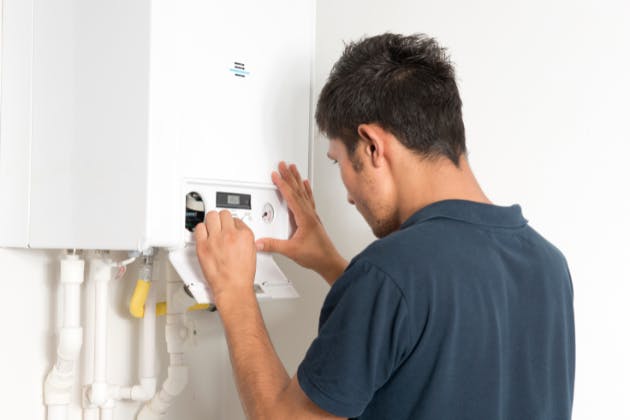At Beales Services, we understand that finding water leaking from your boiler can be concerning. As experienced heating engineers serving Leytonstone, Walthamstow and Woodford, we regularly help homeowners address boiler leaks. If you need immediate assistance, contact our Gas Safe registered engineers on 02034880883 or 07921705246.
Common Causes of Boiler Leaks

Pressure Problems
High boiler pressure is a frequent cause of water leaks. If your pressure gauge reads above 2 bars, excess pressure might force water out through relief valves. This can happen after recent system refilling or due to temperature changes. While you can release pressure through the bleed valve, recurring issues need professional investigation.
To adjust high pressure:
- Turn off your boiler and allow it to cool completely.
- Locate the filling loop, usually a silver braided hose with two valves.
- Slowly open one of the valves to release pressure until it reaches the correct range.
- Close the valve securely.
Corroded Components
Over time, internal components can corrode, particularly in older boilers. Common points of corrosion include pipes, valves, seals, and the heat exchanger. Water discolouration or rust around the leak often indicates corrosion. This typically requires component replacement by a qualified engineer.
Faulty Seals and Joints
Seals and joints naturally degrade over time. Temperature fluctuations, particularly during winter, can accelerate this wear. Leaks often appear around pump joints, pipe connections, or the heat exchanger. While temporary fixes exist, professional replacement ensures long-term reliability.
Heat Exchanger Issues
A cracked heat exchanger is one of the more serious causes of boiler leaks. This often results from age, corrosion, or limescale build-up. If your heat exchanger is compromised, you'll likely notice water leaking from the bottom of your boiler. Given the component's importance, replacement often requires careful cost consideration against a new boiler.
Auto-Air Vent Issues
The auto-air vent removes excess air from your heating system. If it becomes stuck in the open position, it can lead to water leaks. Signs of a faulty auto-air vent include:
- Constant dripping from the top of your boiler
- Gurgling noises in your radiators
Replacing a faulty auto-air vent typically requires professional assistance due to the need to drain and refill the system.
Identifying Leak Sources
Water leaking from different areas of your boiler can indicate specific problems:
Top of Boiler
Leaks from the top often suggest problems with the feed and expansion tank or pressure release valve. These issues typically relate to pressure management within your system.
Bottom of Boiler
Water collecting beneath your boiler might indicate pump problems, pipe connections, or a damaged heat exchanger. This requires prompt attention as continued leakage can damage both your boiler and the surrounding area.
Pipes
Leaks from pipes connected to your boiler often stem from corrosion, loose connections, or frozen pipe damage. While temporary fixes might work, proper repair ensures system longevity.
Frequently Asked Questions
Are there any DIY fixes for a leaking boiler?
While you can tighten loose connections or adjust pressure yourself, most boiler repairs require professional expertise. Attempting complex repairs can be dangerous and may void your warranty.
How long does a boiler typically last before it starts developing leaks?
With proper maintenance, a boiler can last 15-20 years. However, components like seals and valves may need replacement earlier. Regular servicing can extend your boiler's lifespan and prevent premature leaks.
How can I determine if my boiler is actually leaking?
Look for water pooling around the boiler, damp patches or mould on nearby walls, a drop in boiler pressure, or unusual noises. Also, check for warped skirting boards or discoloured flooring near the boiler.
Is a leaking boiler dangerous?
While not immediately dangerous, a leaking boiler can lead to electrical hazards, structural damage, and inefficient heating. It's crucial to address leaks promptly to prevent more serious issues.

